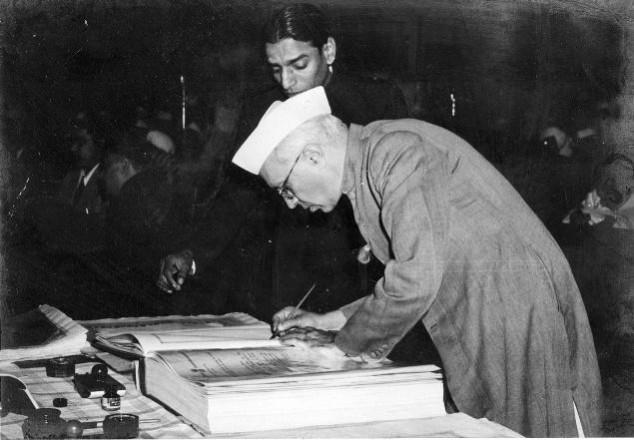
The 'intolerance' debate in the country has now given way to the one over secularism. And that debate is no less intolerant than the one on intolerance.
Why did Home Minister Rajnath Singh rake up the issue on the occasion of the Constitution Day? Are the words secular and socialist a misfit in the Preamble of the Constitution? Why did Indira Gandhi add these in the Preamble in 1976? And what exactly does secularism mean anyway?
If Singh says there was no need to add secularism in the Preamble it's not inaccurate. But if one of those 'secular' leaders in the country had made this statement it wouldn't have set off a storm.
When the BJP government makes a comment on socialism that's seen as a grave error. Actually is it that important? Apparently BJP, whose political ideology is built on the majority religion plank, has no right to comment on secularism.
How we understand secularism has something to do with this 'intolerance.' That's how we've misinterpreted and misunderstood the term. When Indira Gandhi added secular in the Preamble, what was on her mind? Critics have said she unleashed a clever political act under the exigencies of the emergency.
But with the advantage of hindsight we know that act was merely an indication of the general value erosion happening in the country.
When spirit disappears there is more print. Just as a weak defence of a cause turns out to be more noisy. When there obviously was much less secularism left in the country 30 years after independence, the rulers realised that it had to be on paper.
The same holds for socialism. The original preamble clearly offered social, economic and political justice and equality of opportunity. What was the pressing need to make the Preamble more verbose by stuffing in socialism? Because we knew for sure social justice was not working for the masses still stuck in a time warp. For those impoverished millions in villages for whom Gandhi envisaged a Rama Rajya. And those groveling under a clearly inequitable system that marked people by their caste and occupation.
Socialism was the perfect pill. Its presence in the Preamble made everyone feel good. It was the fig leaf, or the piece of satin to cover a cesspool.
Coming back to secularism, did having the lofty ideal in the Preamble help? Did it make us a more religiously tolerant country than before? Obviously not. Instead it gave everyone a convenient political hobby horse.
The reason why the debate on secularism has become so vexatious in India is that we have our very own 'Indian secularism.'
Does secularism mean a complete separation between the state and religion as in the West? Or does it merely mean the co-existence of all religions? Or does it mean special privileges for religious minorities? Or is it a notion that weakens nationalism, as probably Rajnath Singh might have fared? Edward Said said, somewhat in a Gramscian line, that secularism is more of an opposite to nationalism than to religion.
In the Indian context, the broad understanding is that secularism is not intended to displace religion, but acts as a pointer on how, and how far, social institutions can be kept away from the undue influence of religion.
Among the many reductionist treatments that the principle of secularism underwent is its being reduced to unitary terms -- that it's a political principle that protects the minorities against the 'excesses' of the religious majority.
To begin with, this idea undercuts the very principles behind secularism. Are we treating equally the minority overreaches -- such as the rise of Islamic fundamentalism and the rise of Christian evangelism -- and Hindu fundamentalism?
The current confusion only means the way secularism is understood is going to be debated, and it will undergo changes.














